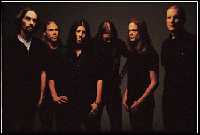Taking their name from the word "amorphous" meaning 'no determinate form or shape', Finland's most creative and acclaimed metal band have certainly lived up to their name along the course of their ten year history. With a vast set of musical influences amongst their membership, Amorphis have taken large strides with each consecutive album and have reached their most ambitious plateau yet. Boasting a sound more aligned with '70s progressive rock bands than modern day metal acts, Amorphis aren't afraid to let go of their past and fly into uncharted territories inspired by their Finnish heritage. The band have always stood against the trends of the day and forged their own unique style amongst hordes of sound-alikes and pretenders Formed around the duo of lead guitarist Esa Holopainen and drummer Jan Rechberger, the two quickly picked up vocalist/guitarist Tomi Koivusaari. Bassist Olli-Pekka Laine joined shortly after, and Amorphis recorded their one and only demo, Disment of Soul, in mid-91. On the strength of this demo, Amorphis secured a multi-album deal with Relapse Records and immediately recorded six songs, two of which were released as a limited edition 7" EP.
Amorphis capitalized on their solid underground following built on the strength of their demo and the 7" - by recording their debut full-length The Karelian Isthmus. Named after an historic Finnish battlefield, The Karelian Isthmus blasted forth with majestically moving atmospheric death metal featuring jagged doom riffs, vocal cries of misery and ethereal synthetizers to complement their new adventurous sound. Before work began on their next album, Relapse Records released the entire early demo recording session as 1993's Privilege of Evil.
In 1994, Amorphis ventured even further into their keyboard-oriented progressive death metal sound and celebrated their rich Finnish history within the music. The band once again recorded in Sunlight Studios and emerged with one of 1994's finest masterpieces of metal, the critically-acclaimed Tales From The Thousand Lakes. Incorporating lyrics from the finnish national poem book, The Kalevala, Amorphis fused elements of traditional heavy metal, doom, death metal and '70s progressive rock to craft an album that stunned not only the band's own followers, but the entire metal underground. Amorphis toured the European continent several times and, in late '94, visited american shores for the first time. Due to the keyboardist's inability to meet tour commitments, new keyboardist (and now an integral member) Kim Rantala was brought in to solidify the line-up. 1995 brought yet another chapter in Amorphis history with the Black Winter Day EP featuring the title track and three unreleased tracks from the Tales... sess ions. The EP held hungry fans over temporarily while the band took a very short rest before writing and recording their third full-length epic...
Where their prior work astounded, this time Amorphis transcended all expectations with Elegy, an eleven-song journey into lush keyboard atmospheres, psychedelic guitar tones and an array of vocal deliveries, summoned by both Tomi and the now-permanent "clean" vocalist Pasi Koskinen. Elegy also features the rock-solid work of new drummer Pekka Kasari, who filled out the six-piece Amorphis line-up. Elegy featured lyrical inspirations from another legendary piece of Finnish literature, The Kanteletar, a book comprised of nearly 700 poems and ballads based on old Finnish traditions. The poems have been passed on by word of mouth from generation to generation, with some of the poems being literally thousands of years old. The Kanteletar is based on everyday life, including the Finnish people's philosophical and religious beliefs, and Amorphis created a spellbinding work of progressive rock/metal anthems based on the book's legend and lore. With vivid cover artwork incorporating ancient Finnish symbols, Elegy trave rsed many musical paths and conjures a variety of moods, from the upflitting ode of My Kantele to the crushingly dismal sentiment of Better Unborn.
1997 brings forth My Kantele, a mini-extension of the monumental Elegy, featuring the acoustic reprise of My Kantele, as well as the all-new two pare epic The Brother-Slayer. The awe-inspiring lead guitar-keyboard interplay of Esa and Kim mines the progressive and melodic veins brought to light within Elegy. Amazing interpretations of Kingston Wall's And I Hear You Call and Levitation by space rock mavens Hawkwind complete My Kantele, and thus turn another page in the ongoing saga of Amorphis...
The rest of 1997 was spent on touring, mainly in Finland and in Germany, but then all of a sudden it became very quiet around Amorphis for almost a year. The band felt burn out feelings from endless touring & decided to keep creative break and see what new would come out.
In the latter part of 1998, the group announced that they would go into the studio to record a new album, this time with a new producer, Simon Effemy. The keyboard player was new too, when Kim Rantal chose to leave Amorphis in 1998. The new keyboard player was named Santeri Kallio and he had recently played with the Finnish metal group Kyyria. The new master piece "Tuonela", which means Hades- the realm of the dead, was released in the whole world 30/3-99. The album is a very successful hybrid between "Elegy" and a more melodicly concentrated rock'n'roll ."Tuonela" is hardly as heavy and brutal as the previous record, which may be due to Pasi Koskinen's melodic voice. But the melodies and the refinements are definitely still there.
Source: http://www.amorphis.net/
